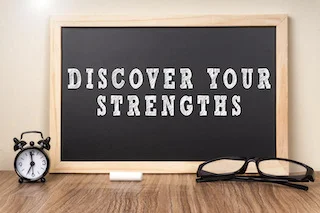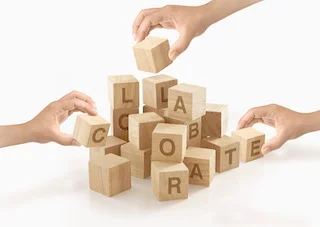Monday, July 29, 2019
welcome to the leADDership brief
A weekly newsletter for creative and innovative people, like you, with ADHD who want timely, helpful, and interesting resources
for leading and living well with ADHD.
Strengths Based
Time Management:
How Tapping into Your
Natural Strengths
Motivates and Energizes You
To Get Stuff Done
When educational psychologist Donald Clifton developed what would become the Clifton’s Strengths Finder Assessement he began with the question “What would happen if we studied what is right with people?”
I love this question and it is what drew me to Clifton’s work over a decade ago. As an adult with, at the time, un-diagnosed ADHD, I was very familiar with what I did wrong and my many weaknesses as I was surrounded by well oiled and finely tuned “normal” executive functioning brains. Reading about Clifton’s hypothesis and research was healing, empowering, and energizing.
As I began to switch my focus from everything I did wrong and was “bad” at to what I am naturally and intuitively good at I began to manage my time better, set better and more realistic goals, advocate for myself at work and home, set better limits for myself, and was generally more happy and content. The other amazing benefit was that as I was more confident with myself and my strengths I could rejoice in, celebrate, and highlight the strengths of my colleagues, friends, and family with integrity and peace. I wasn’t in competition with the world to prove that I wasn’t a complete failure.
I am not alone in this. I’ve heard similar stories from my clients.
A strengths-focused mindset taps into your natural and intuitive motivations. Neuroscience research shows that intrinsic motivation – what you naturally find interesting and rewarding, such as using your strengths – activates your brain’s reward and pleasure centers. Thinking about what you do well increases motivation to pursue that vision. When you tap into your strengths as a motivator it gives you a boost of energy and willpower. Imagining how you can use your strengths connects you to self-confidence and self-awareness making goal achievement feel easier and sparking motivation. When our brains are pinged with interest we release dopamine which helps with motivation, focus, and energy.
Clifton’s philosophy of using talents as the basis for consistent achievement of excellence (our strengths themes) asserts that individuals are able to gain far more when they spend their time focusing on their greatest talents than when they spend time focusing on remediating their weaknesses.
Clifton hypothesized that these talents were “naturally recurring patterns of thought, feeling, or behavior that can be productively applied” (Hodges & Clifton, 2004, p. 257). Your strengths are viewed as the result of maximized talents and mastery is created when one’s most powerful talents are developed and combined with acquired relevant skills and knowledge.
The Clifton’s Strengths Finder assessment is a self-reporting and self-scoring assessment that helps individuals identify, understand and maximize their strength themes. A theme is a category of talents, which are defined as recurring and consistent patterns of thought, feeling, or behavior. The assessment measures the presence of talent in thirty-four distinct strengths themes.
In the books Strengths Finder 2.0 and Now Discover Your Strengths they further identify four leadership strength domains:
Executing – This is the ability to get things done. A good executor is skilled at arranging and managing tasks, events and people, is consistent and focused, and is prepared to take on responsibility for projects.
Influencing – This is the strength to "sell," influence or persuade others to support ideas, projects, tasks, attitudes, or organizational approaches.
Relationship building – This is the ability to encourage people to work together toward a common goal or ambition.
Strategic thinking – A strategic thinker is skilled at analyzing information, seeing links and connections, and thinking both inside and outside the box.
You can check out the two books on Amazon by clicking on the links below.
A free download of the 34 themes and four domains is available to
the leADDership brieF subscribers
People who work in their strengths tend to experience:
Lower anxiety and stress as you gain insights into what you can confidently say “yes” to and what you can confidently say “no” to
Increased self-awareness: you know who you are, what you do best, and how you do it in the world
Achieve more on a daily basis and have more positive, creative and innovative moments
More ability and desire to fully engage and stay engaged at work. I have a client who is really, really good at conflict management and hard conversations. She was somewhat embarrassed to admit she enjoyed it. As she learned about and developed her Harmony, Empathy, Arranger, Relater, and Positivity themes she has been able to use her strengths to develop teams, mediate team conflict, and direct her teams towards common goals and communication.
More self-compassion and empathy. As you understand your strengths you have a lot more tolerance and empathy for your lesser themes and spend less time fretting and worrying about what you’re not good at and more time caring for and developing what you are good at.
A new vocabulary that helps you articulate the value you bring to your work and life. You can use this vocabulary instantly in your work as you communicate with others about your projects, goals, expectations, advocate for yourself, and negotiate for a raise or a promotion
Clarity and confidence about what you do best
Clarity about what motivates and inspires you to get stuff done and make decisions
And most important for today: what motivates you as it relates to how you use your time
LEVERAGING YOUR STRENGTHS THEMES:
MOTIVATION AND ENERGY FOR TIME MANAGEMENT
THAT WORKS FOR YOU
Take the Clifton’s Strength Finder Assessment here.
$19.99 for your top 5 strength themes report
$49.99 for the full report of all 34 themes (a 44% savings, it’s regularly $89.00)n
Download the PDFs of the reports and engage with the questions to deepen your understanding of your strengths themes. I find it especially helpful to know my top five and my bottom five. I have so much more compassion for myself when remember that deliberative is #34 and I have rushed a decision or have some buyer’s remorse.
Keep your learning style in mind as you learn more about your strength themes. The Clifton’s Strengths Finder website has great resources for all learning types: videos, audio, and PDFs of what each theme looks, sounds, and acts like. They also provide you with loads of examples of how each theme or domain might show up at work, home, and play.
Consider the ways in which your strengths might engage with time and time management. For instance, an achiever may want to consider how to get the most done in the least amount of time or a
By understanding your strengths you can better understand why you can and should say no to like tasks, projects, assignments, etc. that just are not intuitive and within your strength’s theme. You can stop wasting your time on things you are not good at and don’t enjoy. This doesn’t meant you quit doing vital things, like paying your bills, getting to work on time, or completing a project on time, because you aren’t talented at it.
It does mean you can have compassion for yourself when you discover it’s not ta character flaw and you can find a work-around or the vocabulary to communicate with colleagues, friends, and family to ask for help or advocate for what you are good at doing.
You can use your unique strengths to use and manage time to your advantage.
ADHD Time Management Examples:
If you have Restorative in your top five you are a great problem solver and good at figuring out what is wrong and resolving it. Because you can analyze a situation, identify potential shortcomings, and make the necessary adjustments you might want to approach time management as a problem or mystery to solve.
If you have Significance in your top five begins you want to make a difference and for the world to be a better place because you are in it. Because your legacy and reputation matters to you use this to inspire you as you plan your day and manage your time. Who will benefit from your time management skills? What will be better because you showed up on time?
If you Adaptability in your top five you respond well to chaos. You can quickly change and respond to circumstances that would frighten or intimidate others. You can find ways to keep moving forward when the unexpected happens. Your natural ability to be in the moment can help others see the way forward. You can use your strength to recenter yourself and others when the schedule or calendar has gone off the rails due to unforeseen circumstances.
If you have Futuristic in your top five you are visionary. Your emotional anticipation and visualization of a better future can inspire you and others to make a dream a reality. You can use your strength to inspire you envision how your day, work, expectations, etc. can be met by better use of time.
A SHORT STORY
What Kevin and I learned about collaboration
and honoring our individual strengths
so that we can use our time wisely and to our advantage.
The summer of 2016 we were “forced” to purchase a new vehicle for me after an accident that totaled my car.
Fun fact: in a showdown between a sedan stopped at an intersection (me), and two SUV’s who crash at the intersection and slide into you, the sedan loses and the SUV’s limp off with dented fenders.
In the aftermath we decided to upgrade to an SUV for a variety of reasons. I had been happily driving Nissan sedans for many years and just assumed we’d move to one of their SUV models without even considering other options. Thankfully I have a spouse and partner who works with me to take a more deliberate approach to decision making. And he has a partner who helps him move forward and activate that decision.
This is a story of how leaning into and appreciating the strengths of each stakeholder can help you save time and make better decisions.
A little context for you.
According to the Clifton’s Strengths Finder Assessment this is how Kevin and I assess:
Kevin's Top Five Strengths Themes
Pam's Top Five Strengths Themes
Hopefully you can see the potential problem here. We are almost exact opposites on what motivates and inspires us to get stuff done, make decisions, and how we want to spend our time.
I have the results for all 34 of my strengths themes and my lesser themes (numbers 33 and 34) are deliberative and consistency, both of which are in the executing domain and I think consistency is number 6 or 7 for Kevin.
What does Clifton’s say about each of our top two? (all quotes are from www.gallupstrengthscenter and my personal dashboard of results)
Kevin’s Top Two Strength Themes:
“People with strong Deliberative talents bring a thorough and conscientious approach to their endeavors. They have the ability to reduce risk and prevent problems through natural anticipation and careful thought. As a result, they tend to make outstanding decisions.”
“The genius of those with strong Responsibility talents stems from the deep sense of dedication and ownership they feel toward the things they commit to.They are people of their word, and others know they can rely on and trust them”
Pam’s Top Two Strength Themes:
“People with strong Strategic talents bring creative anticipation, imagination, and persistence to the groups and projects they work on. They can quickly weigh alternative paths and determine the one that will work best and most efficiently. They find the best route moving forward”
“Achievers love to complete tasks, and they derive fulfillment from their accomplishments. Putting it simply, people with high Achiever have a strong inner drive — an innate source of intensity, energy, and power that enables them to push hard to get things done. As a result, they often set the pace and define productivity levels for the people around them.”
When you add ADHD to the equation of my strengths it adds up to an impulsive, impatient, energetic, and driven decision maker. I make decisions quickly and intuitively and have a fairly high risk threshold. I am often anxious and frustrated by delays. I can also overlook details and other important facts that have at times been costly both financial and in time wasted fixing what I overlooked.
Kevin on the other hand is pretty much the exact opposite in his approach to decision making. He is thorough and conscientious. He has a lower risk threshold than I do. He needs facts, data, research, and a good spreadsheet. His decisions are thoughtful and he rarely has cause to regret them. It can also mean some decision paralysis for him which can also be costly in terms of opportunities missed.
I am motivated by success, reward, inspiration, and movement. I have a tendency to leap before I look.
Kevin is motivated by what is right and what he can stand behind, his integrity is on the line. He’s definitely a look before you leap decision maker.
With these facts in mind let’s get back to the vehicle purchase: I was ready to purchase a Nissan SUV ASAP. Kevin was not so ready.
These were the common denominators:
We were committed to purchasing an SUV
We were in agreement on the purchase amount
We were in agreement about the features we wanted
All good so far.
This is where it could have fallen apart.
I was impatient, I knew what I wanted and when I wanted it: NOW, NOT LATER. I was ready to purchase an SUV yesterday. But I didn’t have all the facts or all the data to make a really wise decision I would be happy with post purchase. And we tend to drive our vehicles for a long time so I needed to be happy a long time.
Enter Kevin’s strengths into this decision making process. He wisely suggested we put together my list of “non-negotiables” and then do a bit of research on available SUV’s that met these requirements.
Using his relater strength he tapped into my learner and input strengths which allowed me to recognize that I needed to slow down and lean into his deliberative and responsible approach.
“We want the same things, we just need to collaborate on how we were going to achieve that goal” he said.
And my “achiever” was happy to get on board with that.
One of my blue-sky wish items was a more fuel-efficient and environmentally-friendly SUV. I wasn’t sure if such a thing existed in our price range and I was impatient. I also didn’t want to be disappointed.
We sat down and put together a spreadsheet of required features and plugged in the compatible SUVs. A model I would never have considered met all the requirements plus my big wish item of fuel-efficient and environmentally-friendly. It also had features I didn’t even know I wanted and it was well within our price range. It outperformed my impatient choice in every category.
Once we’d done our due diligence with the research and test driving we were both confident and happy with our model choice. And we could move quickly when there was only one “pearl white” model with all the options in all of Iowa.
To my ADHD impulsive brain the initial slow down Kevin brought to the process felt almost torturous but I have enough experience to know that by allowing Kevin’s strengths to compliment my strengths we actually save time and use our time much better.
We haven’t wasted any time arguing about it before or since
We haven’t wasted any time in buyer’s remorse
We haven’t wasted any time time fixing an impulsive decision
We haven’s wasted time recovering from a missed opportunity
We didn’t waste time test driving SUVs we wouldn’t purchase
We used our time researching dealerships that had the SUV we wanted to test drive
We used our time wisely and with clear goals in mind so that we knew what to say “yes” to and what to say “no” to
We were on the same page with the same goal, we didn’t waste time defending our positions
We used our time wisely to leverage and appreciate the strengths we each brought to this process
Want free cheat-sheets, worksheets, and other resources that will help you thrive and succeed in your ADHS life? Subscribe to the leADDership brief where you get exclusive access to free downloads.
What Else Do You Need To Know?
Coach Pam









